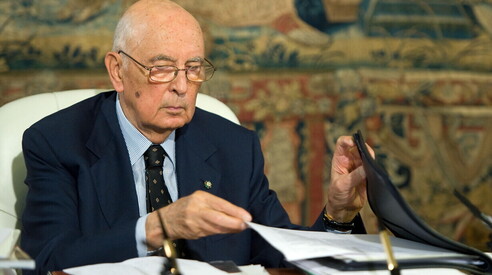Napolitano, the PCI, and the risk of do-gooder trivialization


Ansa photo
In the year of the centenary of his birth, the biography of Gregorio Sorgonà was published, but it omits to cite at least a couple of important texts in the biography of the future president.
Preceded and followed by several press articles, a conference in the Senate at the end of June commemorated Giorgio Napolitano on the centenary of his birth. It was, of course, an almost obligatory initiative, given his importance for at least two reasons. It was Napolitano who first showed his party the path to becoming a fully-fledged member of the European left; that European left that Berlinguer was unsure of (but in truth, unwilling to) follow, and which it took until the fall of the Eastern regimes for him to actually pursue, abandoning the very term "communist." Had he become party secretary, Umberto Ranieri observed in Il Riformista, the history of the Italian left would have been different: an undoubtedly intriguing hypothesis, if perhaps a bit simplistic. But the importance of Napolitano's role in our more recent history lies above all in the fact that under him, for a whole series of reasons highlighted by Sabino Cassese in the Corriere, the centrality of the Presidency of the Republic as the cornerstone of our political and institutional system was clarified and accentuated . This centrality, as is well known, rests on the very vagueness of the indications the Constitution reserves for presidential powers.
The centenary also saw the publication of a biography by Gregorio Sorgonà , a historian who has already authored several works on other communist figures: Giorgio Napolitano (Salerno publishers). The book, which contains some interesting material, raises more than a few concerns in the reader. Let's set aside the well-founded question of relying, for too many important events, almost exclusively on Napolitano's subsequent autobiography (Dal PCI al socialismo europeo, Laterza 2005) rather than on firsthand documents. Far more questionable is the author's omission of citing at least a couple of key texts in the future president's biography.
The first of these texts concerns 1956, the year of the 20th Congress of the Communist Party of Italy (CPSU) but also of the Soviet invasion of Hungary. The 8th Congress of the Italian Communist Party (PCI) also took place in December. Sorgonà hints at what Napolitano would write about it in 1986 or, fifty years later, in his memoirs, and otherwise makes a general reference to the orientation of that entire generation of young, Togliatti-supporting, and pro-Soviet communist leaders. He naturally writes that "he was the first to defend the USSR without public hesitation." But quoting some passages from the speech, which are reproduced in the volume of the congress proceedings, would have provided a more effective picture of what communist faith in the USSR meant in those years, even for Giorgio Napolitano. For example, where he stated that the Soviet intervention in Hungary had prevented "a hotbed of provocation from being created in the heart of Europe" and prevented the country from "falling into chaos and counterrevolution." And it is quite shocking, when Napolitano moved on to discuss the party's southern policy, the sector he was dealing with at the time, to read his harsh attack on reformism (the "resurgent dangers of sectarianism and reformism," "a new reformist danger," etc.), with the polemical use of a term that, not coincidentally, his faction, though reformist in fact, was still unable to use many years later (falling back on the term "migliorista").
But there is another text that the author fails to cite, and in this case it is a more serious omission because it concerns the man who first offered a broad picture of those persecuted and killed in the Soviet Gulag, Alexander Solzhenitsyn . When the Russian writer was arrested and expelled from the Soviet Union, it was Napolitano – then head of the party's Culture Commission – who wrote an article about him, published in L'Unità on February 20, 1974, and simultaneously in the PCI weekly Rinascita . After criticizing those who had exploited the episode for a "blind relaunch of the darkest images of anti-Soviet propaganda," Napolitano acknowledged that the affair was "undoubtedly significant and worrying." But he also reaffirmed "the immense liberating significance of the October Revolution , the extraordinary record of transformations and successes of the socialist regime." Precisely this increasingly blind denial, he continued, had "marked the condemnation of a work like Solzhenitsyn's, which had nevertheless arisen from a just struggle to break with the Stalinist past." A judgment that effectively justified the writer's expulsion.
It's not for me to say why the author failed to reproduce at least some passages from Napolitano's speech at the 1956 congress, or even to mention his 1974 article. I can only observe that these kinds of omissions risk confirming a tendency toward a do-gooder trivialization of the history of Italian communism, according to a reading that tends to smooth over its rough edges, anticipating its distinctions and ruptures with the Soviet model. This is precisely what has happened in recent years—through books, films, and exhibitions—with Enrico Berlinguer, and it is to be hoped that this will not be repeated with Giorgio Napolitano.
More on these topics:
ilmanifesto





